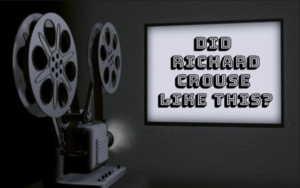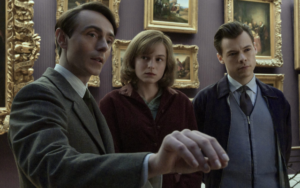RICHARD’S CTV NEWSCHANNEL REVIEWS FOR NOVEMBER 06 WITH MARCIA MACMILLAN!
 I join CTV NewsChannel anchor Alexandra Pinto to have a look at Harry Styles in “My Policeman” and the Jennifer Lawrence drama “Causeway.”
I join CTV NewsChannel anchor Alexandra Pinto to have a look at Harry Styles in “My Policeman” and the Jennifer Lawrence drama “Causeway.”
Watch the whole thing HERE!
 I join CTV NewsChannel anchor Alexandra Pinto to have a look at Harry Styles in “My Policeman” and the Jennifer Lawrence drama “Causeway.”
I join CTV NewsChannel anchor Alexandra Pinto to have a look at Harry Styles in “My Policeman” and the Jennifer Lawrence drama “Causeway.”
Watch the whole thing HERE!
 I appear on “CTV News at 6” with anchor Andria Case to talk about the best movies and television to watch this weekend. This week I have a look at Harry Styles in “My Policeman,” the Jennifer Lawrence drama “Causeway, the music doc “The Return of Tanya Tucker featuring Brandi Carlile.”
I appear on “CTV News at 6” with anchor Andria Case to talk about the best movies and television to watch this weekend. This week I have a look at Harry Styles in “My Policeman,” the Jennifer Lawrence drama “Causeway, the music doc “The Return of Tanya Tucker featuring Brandi Carlile.”
Watch the whole thing HERE! (Starts at 37:37)
 I join NewsTalk 1010 host Jim Richards on the coast-to-coast-to-coast late night “NewsTalk Tonight” to play the game “Did Richard Crouse Like This?” This week we talk about Harry Styles in “My Policeman,” the Jennifer Lawrence drama “Causeway, the music doc “The Return of Tanya Tucker featuring Brandi Carlile.”
I join NewsTalk 1010 host Jim Richards on the coast-to-coast-to-coast late night “NewsTalk Tonight” to play the game “Did Richard Crouse Like This?” This week we talk about Harry Styles in “My Policeman,” the Jennifer Lawrence drama “Causeway, the music doc “The Return of Tanya Tucker featuring Brandi Carlile.”
Listen to the whole thing HERE!
 I joined CP24 to have a look at new movies coming to VOD, streaming services and theatres. Today we talk about Harry Styles in “My Policeman,” the Jennifer Lawrence drama “Causeway, the music doc “The Return of Tanya Tucker featuring Brandi Carlile,” the coming of age story “Armageddon Time” and the drama “The Swearing Jar.”
I joined CP24 to have a look at new movies coming to VOD, streaming services and theatres. Today we talk about Harry Styles in “My Policeman,” the Jennifer Lawrence drama “Causeway, the music doc “The Return of Tanya Tucker featuring Brandi Carlile,” the coming of age story “Armageddon Time” and the drama “The Swearing Jar.”
Watch the whole thing HERE!
 I sit in on the CKTB Niagara in the Morning morning show with host Tim Denis to talk the new movies coming to theatres. This week we look at Harry Styles in “My Policeman,” the Jennifer Lawrence drama “Causeway” and the music doc “The Return of Tanya Tucker featuring Brandi Carlile.”
I sit in on the CKTB Niagara in the Morning morning show with host Tim Denis to talk the new movies coming to theatres. This week we look at Harry Styles in “My Policeman,” the Jennifer Lawrence drama “Causeway” and the music doc “The Return of Tanya Tucker featuring Brandi Carlile.”
Listen to the whole thing HERE!
 I sit in on the CFRA Ottawa morning show with host Bill Carroll to talk the new movies coming to theatres including Harry Styles in “My Policeman,” the Jennifer Lawrence drama “Causeway, the music doc “The Return of Tanya Tucker featuring Brandi Carlile,” the coming of age story “Armageddon Time” and the drama “The Swearing Jar.”
I sit in on the CFRA Ottawa morning show with host Bill Carroll to talk the new movies coming to theatres including Harry Styles in “My Policeman,” the Jennifer Lawrence drama “Causeway, the music doc “The Return of Tanya Tucker featuring Brandi Carlile,” the coming of age story “Armageddon Time” and the drama “The Swearing Jar.”
Listen to the whole thing HERE!
 Watch as I review three movies in less time than it takes to do a jumping jack! Have a look as I race against the clock to tell you about Harry Styles in “My Policeman,” the Jennifer Lawrence drama “Causeway” and the music doc “The Return of Tanya Tucker featuring Brandi Carlile.”
Watch as I review three movies in less time than it takes to do a jumping jack! Have a look as I race against the clock to tell you about Harry Styles in “My Policeman,” the Jennifer Lawrence drama “Causeway” and the music doc “The Return of Tanya Tucker featuring Brandi Carlile.”
Watch the whole thing HERE!
 Told on a broken timeline with dual storylines, “My Policeman,” starring Harry Styles, and now streaming on Prime Video, is the story of friendship, interwoven relationships and secrecy.
Told on a broken timeline with dual storylines, “My Policeman,” starring Harry Styles, and now streaming on Prime Video, is the story of friendship, interwoven relationships and secrecy.
Based on the novel of the same name by Bethan Roberts, the film revolves around three characters, visited in 1998 Britain with flashbacks to 1957.
When we first meet Tom, Marion and Patrick, played in latter day by Linus Roache, Gina McKee and Rupert Everett, it is Tony Blair-era England. Former museum curator Patrick has suffered a severe stroke and retired teacher Marion is caring for him in his recovery even though her husband Tom wants nothing to do with their ailing guest. “He was always in your life,” Marion reminds Tom, “in our lives.”
Flash back in time 40 years. Tom and Marion, now played by Styles and Emma Corrin as a fresh-faced young police officer and school teacher, are falling in love. “He’s just perfect,” she says. “He’s Tom.”
In an effort to impress Marion, Tom introduces her to high-minded museum curator Patrick, now played by David Dawson. As their friendship blossoms, Marion suspects the connection between the two men is something more than platonic.
Sure enough, before you can say “throuple,” Tom and Patrick have formed a romantic bond and have become clandestine lovers. The true depth of their love, however, doesn’t become clear to Marion until she reads Patrick’s diary, as he convalesces in her home forty years later.
“My Policeman” is a beautiful looking but somewhat dull exercise in melancholy. Every frame is touched with a certain kind of wistfulness, which, over time, gives way to a sort of solemn melodrama. A fiery heat should ignite in this story of complicated emotions and prejudice, but here it is barely a glowing ember, scarcely enough to illuminate the film’s underlying themes.
In the performances, restraint is the name of the game. The English reserve on display is palpable, which befits a story set in a time when homosexuality was illegal in Britain, but it does hold much of the drama at arm’s length.
As young Patrick, Dawson introduces passion to the film, effectively portraying the character’s nuanced wit, fervor, pain and charm.
Of Marion’s portrayers, McKee takes the edge, giving the elderly woman a weathered view on life as a person with regrets who attempts to atone (NO SPOILERS HERE) for the actions of her younger self.
Styles, the over-the-title star, earns kudos for applying his talents to challenging roles like this and his work in “Don’t Worry Darling,” but stacked up against his co-stars here, the sense of longing and emotion necessary to form a believable character, is missing from his take on Tom.
“My Policeman” is an elegant, but dry, movie that should be a fierce hymn against prejudice and the erosion of personal freedoms but settles for melodramatic romantic tragedy.
 Richard and CP24 anchor Nneka Elliot talk about the weekend’s four big releases, including “Finding Dory,” the buddy comedy “Central Intelligence” with Duane Johnson and Kevin Hart, and a duo of documentaries, “De Palma,” an unflinching look at the films of Brian De Palma and the self explanatory “Raiders! The Greatest Fan Film Ever Made.”
Richard and CP24 anchor Nneka Elliot talk about the weekend’s four big releases, including “Finding Dory,” the buddy comedy “Central Intelligence” with Duane Johnson and Kevin Hart, and a duo of documentaries, “De Palma,” an unflinching look at the films of Brian De Palma and the self explanatory “Raiders! The Greatest Fan Film Ever Made.”
Watch the whole thing HERE!